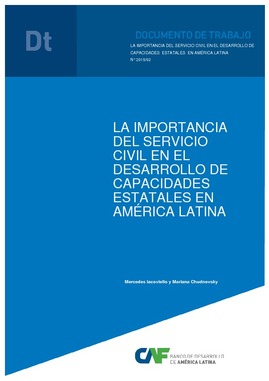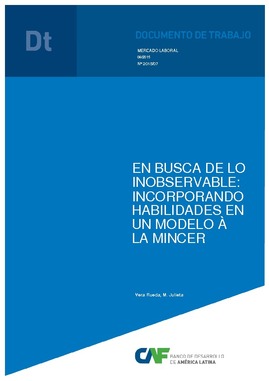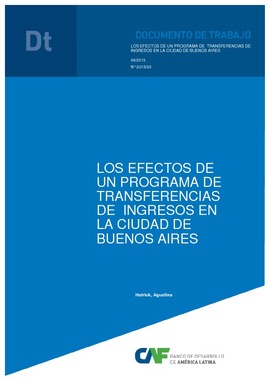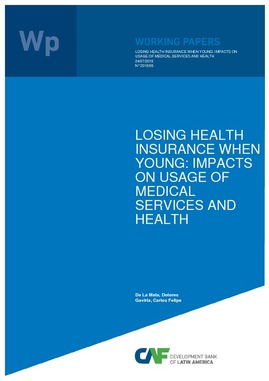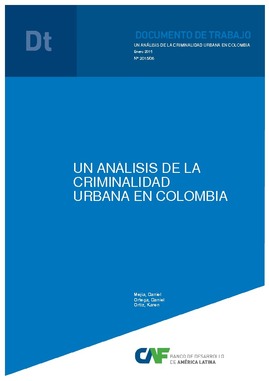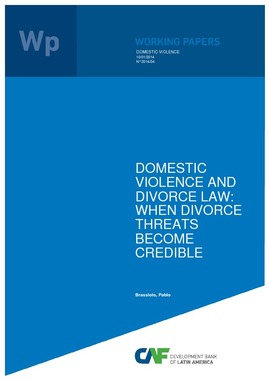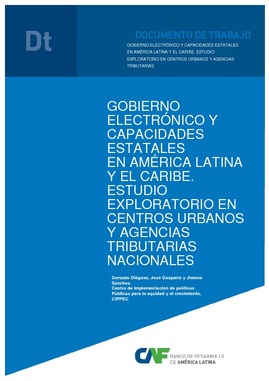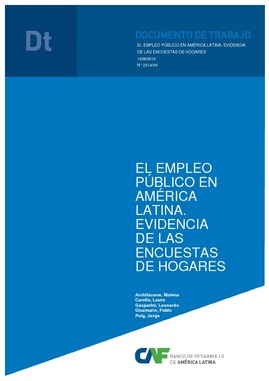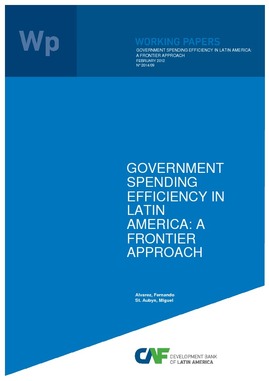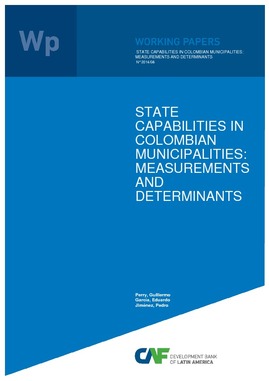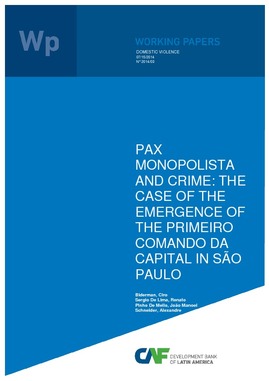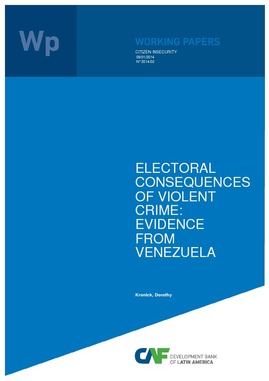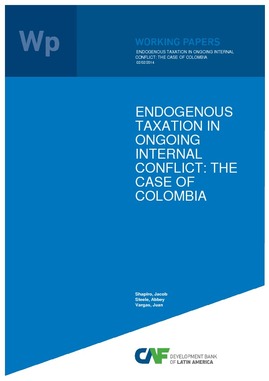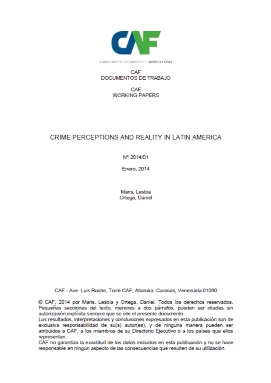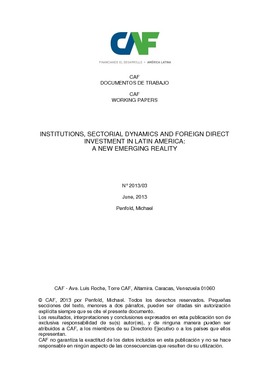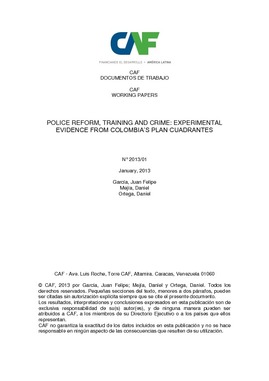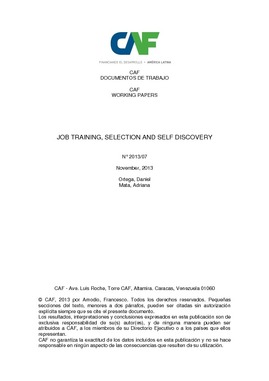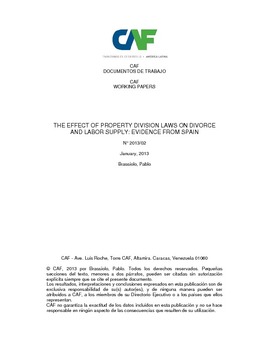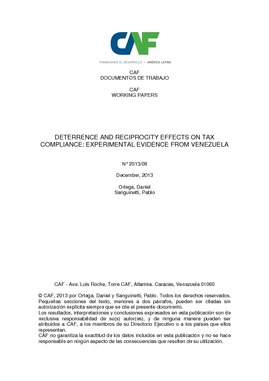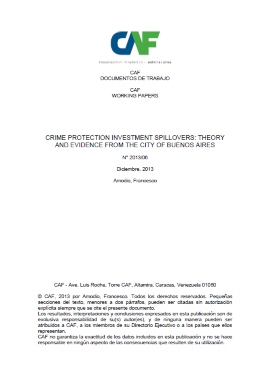6.1 Documentos de trabajo en investigación socioeconómica: Envíos recientes
Mostrando ítems 181-200 de 259
-
La importancia del servicio civil en el desarrollo de capacidades estatales en América Latina
(CAF, 2015-07)El objetivo de este artículo es analizar el vínculo entre el Servicio Civil y la capacidad del sector público de implementar políticas. Para ello, examina la relación del Servicio Civil con (1) la institucionalidad formal ... -
En busca de lo inobservable: incorporando habilidades en un modelo à la Mincer
(CAF; Buenos Aires, 2015-07)En este trabajo se busca replicar el modelo básico de Jacob Mincer (1974), con el objeto de encontrar un mejor estimador del efecto de la educación sobre los ingresos, controlando no solo por variables observables sino ... -
Los efectos de un programa de transferencias de ingresos en la ciudad de Buenos Aires
(CAF, 2015-06-01)Las transferencias condicionadas de ingreso, ampliamente extendidas en América Latina, afectan decisiones económicas de sus beneficiarios y tienen impactos sobre distintas dimensiones de su bienestar. En este trabajo, ... -
Losing health insurance when young: Impacts on usage of medical services and health
(CAF, 2015-04)In this study we exploit a regulation in Colombia that exogenously changes health insurance coverage of young adult dependents, specifically those turning 18 years old, to analyze the effects of losing health insurance ... -
Un análisis de la criminalidad urbana en Colombia
(CAF, 2015-01)Este trabajo hace una descripción detallada de las principales cifras de criminalidad de Bogotá, Medellín, Cali y Barranquilla – que abarcan el 30% de la población de Colombia – utilizando los datos de la Policía Nacional ... -
Domestic Violence and Divorce Law: When Divorce Threats Become Credible
(CAF; Caracas, 2014-10-01)This paper investigates whether lowering the cost of divorce can reduce domestic violence. The cost of divorce influences the bargaining position of spouses, and thus, their behavior within the marriage. This study takes ... -
Gobierno electrónico y capacidades estatales en América Latina y el Caribe. Estudio exploratorio en centros urbanos y agencias tributarias nacionales
(CAF, 2014-09-13)El trabajo tiene como finalidad identificar las herramientas con las que cuentan las administraciones gubernamentales de América Latina en materia de gobierno electrónico, a través del relevamiento de variables que dan ... -
El empleo público en América Latina. Evidencia de las encuestas de hogares
(CAF; Caracas, 2014-09-13)El objetivo de este trabajo es aportar evidencia sobre el empleo público en América Latina durante las últimas dos décadas (período 1992-2012). Éste es un trabajo descriptivo que provee un panorama del empleo público en ... -
Government Spending Efficiency in Latin America: A Frontier Approach
(CAF, 2014-09)Government spending efficiency in providing education and health is evaluated across countries of the world, with a special emphasis on Latin American countries. Using stochastic frontier and data envelopment analysis, it ... -
State Capabilities in Colombian Municipalities: Measurements and Determinants
(Universidad de los Andes; CEDE; CAF, 2014-08)This paper constructs a comprehensive set of State Capacity indicators for Colombian municipalities, focusing in four basic governmental capabilities: fiscal, financial, physical and operational. First, a group of relevant ... -
Pax Monopolista and Crime: The Case of the Emergence of the Primeiro Comando da Capital in São Paulo
(CAF; Caracas, 2014-07-15)This paper documents a rare phenomenon: the consequence of the dominance of a single criminal gang in the city of São Paulo, the Primeiro Comando da Capital (PCC). Using unique data to identify entry in geographically ... -
Electoral Consequences of Violent Crime: Evidence from Venezuela
(CAF, 2014-05)To what extent to do voters hold political incumbents accountable for policy outcomes? This paper considers retrospective voting in the context of violent crime. Using a novel panel data set on county -and neighborhood- ... -
Endogenous Taxation in Ongoing Internal Conflict: The Case of Colombia
(CAF, 2014-02)Recent empirical evidence at the cross-country and subnational levels suggests that internal conflicts harm state capacity and tax performance. On the face of it this is odd: internal conflict should create strong incentives ... -
Crime Perceptions and Reality in Latin America
(CAF; Caracas, 2014)We show that perceptions of insecurity are strongly correlated with victimization at the individual level and suggest that the reason this relationship is usually not uncovered in simple cross country studies is that they ... -
Institutions, sectorial dynamics and foreign direct investment in Latin America: a new emerging reality
(CAF; Caracas, 2013)Despite uncertainties in the global economy, Latin American countries have attracted a significant amount of Foreign Direct Investment (FDI) in recent years. Investing in Latin America is now a central pillar of many ... -
Police reform, training and crime: experimental evidence from colombia's plan cuadrantes
(CAF; Caracas, 2013)The Plan Nacional de Vigilancia Comunitaria por Cuadrantes (PNVCC) is a new police patrolling program introduced in the eight major cities of Colombia in 2010 by the National Police. The strategy divides the largest cities ... -
Job training, selection and self discovery
(CAF; Caracas, 2013)We randomly assign 1250 unemployed men and women to be invited once or twice to a specific-skills training program offered by a large multinational firm as part of its social responsibility efforts. Individuals with the ... -
The effect of property division laws on divorce and labor supply: evidence from Spain
(CAF; Caracas, 2013)I study how the relative bargaining position of spouses affects the incidence of marital dissolution and the labor supply decision of intact couples. I identify exogenous variation in bargaining position within the household ... -
Deterrence and reciprocity effects on tax compliance: experimental evidence from Venezuela
(CAF; Caracas, 2013)A recent debate on tax compliance asks whether enforcement mechanisms can be complemented, or even substituted by appeals to the taxpayer’s tax morality: his or her intrinsic willingness to pay taxes, motivated by purely ... -
Crime Protection Investment Spillovers: Theory and Evidence from the City of Buenos Aires
(CAF; Caracas, 2013)This paper studies spillover effects among potential crime victims from investment in observable protection technologies. Criminals and potential victims interact in a frictional market for offenses. Externalities within ...


